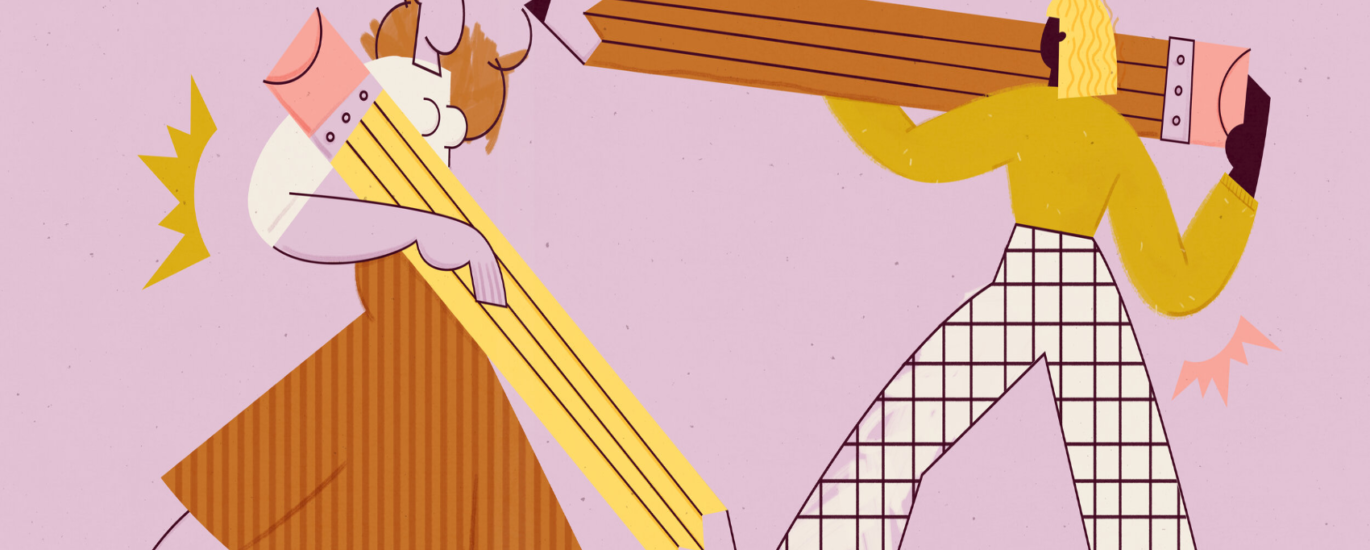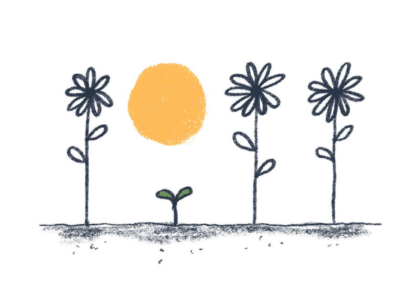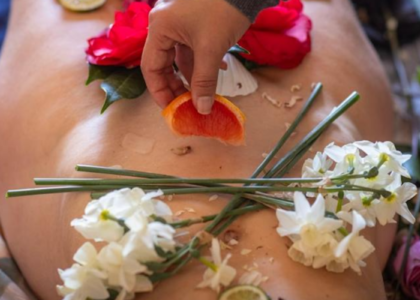“a conscious attempt at being a cycle breaker for our family”
In the course of this season, we’ve gone in depth and up close with dozens of people’s experiences navigating present-day patriarchy. We’ve heard stories of personal struggle, of generational trauma, of feminist revelations. We’ve listened to fantastic essays on what a more egalitarian future might look like, and we’ve been pointed towards critical changes that our world and our culture are sorely overdue for. On today’s episode, we’re going to be talking about what it takes to actually make those changes happen, about the process of change itself. We’ll be talking about how challenging the idea of change can be, about some of the forces which fight against it – tooth and nail – and about the harm that those conflicts can cause. But ultimately, we’re going to be talking about how essential these acts of transformation are – for ourselves, for our culture, for our world – and how everyday people just like you and I can make these changes manifest.
To help us in this exploration we’re joined by Shauna Rensch and Lauren Prakke. We’re so grateful to feature their voices.
Our Guests
Shauna Rensch

Shauna Rensch (she/her) is a wife and mother of four kids ages 16 to 6. She grew up in the north suburbs of Chicago but moved to Arizona with her family at the end of high school. She went to ASU looking at various degrees, but decided on education before taking time off to get married and have her first child. She went back to school in order to complete a bachelor’s degree at NAU and started teaching. She has taught from kindergarten through sixth grade but loves teaching math above anything else. She completed a master’s in elementary education from NAU in 2015. She is currently taking time off from teaching but looks forward to more work within the education field in the future. Shauna loves reading, embroidery, long walks with beautiful views and road trips with her family.
.
Lauren Prakke (she/her) is a cultural innovator, strategic advisor and futurist. Prakke founded Restless Buddha Productions which harnessed a team of international experts across a broad spectrum of the arts including film, theatre, art to simultaneously raise capital and social awareness. Restless Buddha has been featured in numerous newspapers and magazines from Vanity Fair to The Times. Prakke is an int’l lecturer, writer, and curator of contemporary art, a theatre producer and a social activist with an expertise on woman’s issues. Prakke is a TED speaker, founded & chaired The Tate Young Patrons at The Tate, served as co-chair of Women for Women International Leadership, Chairman of The Whitechapel Patrons and on the Board of Women of the World at The Southbank Centre. Prakke was an Interest Rate Swaps broker in both NYC & in London for nearly a decade. She was graduated in 19th Century English Literature and has a post grad degree Contemporary Art. She is a relentless reader and an autodidact polymath.
Lauren Prakke
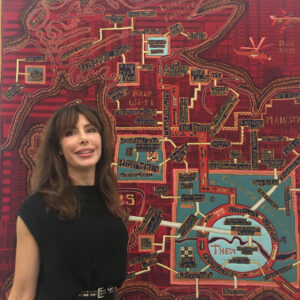
Shauna Rensch
Before I begin my story I’d like to qualify it as a piece of an obviously much larger picture. Though I believe it important to share my mom’s life story as it relates to her struggles with patriarchy, and I know she would too, I also believe it would diminish my mom’s memory to define her life, triumphs and failures, by that one piece of her history. Patriarchy was a foundational part of her life, and her battles within and against a patriarchal family structure were certainly a lens she perceived the world through, but she was a sum of so many other experiences. My mom would agree that patriarchy, the structure that defines a societal hierarchy in which men are allowed rights and privileges to power over women and other groups, sends out negativity that interweaves into so many stories and aspects of our lives, and this story, her-story, is meant to be focused on her life.
I grew up at the intersection of two worlds. The teachings of two generations were at odds from as young as I can remember all the way until the untimely passing of my mother at the young age of 62. I lived from the ages of 7 to 11 in my grandparents’ house with my mother and three younger siblings. The youngest was 6 weeks old when we moved in after my parents’ divorce. My grandparents were first generation Americans, their parents all having emigrated from Greece. The teachings of those ancestors were passed down to my mother, and to us, both by their actions and in the stories told about their past. They believed in practicing traditions, and they displayed the habits of what I can now observe as “the natural patriarchy” of an Orthodox, Greek family that ran deep in the fibers of their lives.

My grandmother was the eldest of three girls. When the third daughter was born the story told was that her mother (my great grandmother) wouldn’t (couldn’t?) even hold her or look at her because she had failed to have a son. My grandmother was 33 when she married and weighed 98 pounds, but “let herself go” as she got older (a common story told by my grandfather to me, speaking of his wife’s physical appearance, often while my grandmother was present). Women were not allowed on the alter at the Greek Orthodox Church. We found this out when my sister at 4 or 5 ran to see what beautiful ornaments were up there and was heavily scolded and shamed. My mother was the oldest of three children and the only girl. She wasn’t given a middle name because she’s a girl But her brother, the oldest son, was given both his father’s first and middle name, only switched around (a long, common family tradition passed down with each generation). These are just a few of the stories and memories I have from my childhood that now ring clear to me of examples of “inherited patriarchy”. I witnessed first-hand, as I watched my mother’s relationship with her father and brothers over the years, just how much these assumed roles have the power to wreak havoc on a woman’s self-esteem and self-worth as she (like anyone) struggles to find her place in the world. That doesn’t change that my grandparents were loving and amazing to me. I cherish the time I got to spend with them. But these stories are also part of my history, and they were an even bigger part of my mother’s. I can see now as an adult woman how much my mother struggled to make sense of these unbalanced dynamics within her family.
However, as prevalent as some of these issues were, and how much they could have been more a part of who I am today, there is one reason they are not as strongly rooted in my present character: and that reason is my mother. One of the greatest pains of my mother’s life was that these stories, traditions and habits were not just there at the start of her life, but they were her entire life. She was raised in this reality. This reality shaped everything about her. I saw it too, but I see now that I always had her voice on the other side reminding me that this was an unfair setup. A rigged system. And that she was not going to let it affect who me and my sisters (or my brother for that matter) would become. In many ways, I believe my mother felt the pain of being a woman in this position for us so we didn’t have to. I see now how my mother, in both energetic and physical ways, literally stood between her family and her children. She was a strong, powerful dividing line of the “old way” in which she was raised, and the “new reality” she had built for me and my siblings. She struggled with how belittling it felt to be dismissed based on her sex her whole life, and her fight against the patriarchy and traditions of her family was a burden she carried with her until her passing (which, as I record this, was a little over a year ago).
My mother moved out of her parent’s home early, married a non-Greek (the first in her family to ever do so), got divorced, made her own way financially as a graphic designer, and taught herself something new every time the winds of technology changed and demanded her to do so. She lived a different story than many young Greek women do (divorced or otherwise) which me and my siblings watched. She gave us her example in both her words and actions. I was devastated by the divorce of my parents. To me it was sudden and dramatically life altering. After the divorce we quickly moved and I saw very little of my father after we left Arizona and moved back to Chicago with my mother’s parents. I watched the impact the split had on her, and as I compared my life to my peers, the struggles of a single woman became increasingly apparent. She now had to fulfill multiple roles of a stable home: Be a nurturing presence and the working provider. I can also see now, as I reflect on the many communications and types of experiences my mother dealt with, that she was consistently at the affect of the societal judgment that came with being “without a husband”. I didn’t know a single other child with divorced parents and it felt very “othering”.
…these stories, traditions and habits were not just there at the start of her life, but they were her entire life. She was raised in this reality. This reality shaped everything about her
Even her immediate family gave her judgments about her divorce. My great-grandmother, who moved to the US from Greece when she was 16, told my mom when she came back home that the divorce would never have happened if she had married a Greek man. My mom told us the story with the byline that it was “just how Yia Yia (Greek for grandma) was”. It was matter of fact. A belief that staying within the traditional roles meant things worked out better. But Yia Yia had a hard edge to her when she communicated these things to my mother. An edge that clearly stemmed from her own pain in coming from the world she did. She had been a victim to patriarchal circumstances herself. Her family had sent her to the US in place of her brother because after they got a ticket for him to travel, Greece had drafted all able men into the military and they weren’t allowed to leave the country. She said she was 16 but there was debate in the family about her lying about her age to travel, and it is commonly accepted that she was much more likely only 14 years old when she left her home in Greece. She came through Ellis Island on a boat and was met by a family member (maybe an uncle). Her brother was supposed to work in the United States and send money home. When she had to step in, her family promised that it would be temporary but she didn’t make it back to Greece for many years and, in fact, never saw her parents again. This was a sadness Yia Yia carried with her forever, and it was noticeable whenever she spoke (with heartache and bitterness) of what she lost and what she had to endure during her immigration. She got married and worked as a seamstress and then had three girls (which as I noted earlier, was a badge of shame and disappointment for her family to have never had a son). We all knew, though perhaps only view it now with the clarity of the symptoms of a greater patriarchal play, that her life took the very specific path it did because she was a girl.
My mom was humbled and shocked by the breakdown of her marriage, but she didn’t let it break her. She had four young kids and had to move back in with her parents “kicking and screaming” (her own words — as it was something she never wanted to do), but she came to understand this as a very important path she needed to grow for herself. She would share with me and my siblings over time that she “had to return in order to heal”. She told me many times how she needed to work on healing her relationship with her parents, and that she chose to see her divorce as an opportunity to do so. She needed to work on her own forgiveness and understanding of their marriage, while still being able to tell the truth about how she felt now as a grown woman with kids of her own. She needed (and was grateful) to move back home in order to learn how to stand up for herself. She needed to stop running away from the feelings of low self-worth she had had her whole life from being raised in a male-dominant, patriarchal home — and I appreciate now, despite the circumstances of divorce that forced her to do so, the woman my mother became. I realize that it was this experience that gave her the strength she needed to raise me, my sisters and my brother to not accept the norms of the Orthodox, patriarchal systems we saw around us.
It also gave my mom a chance to work on her relationship with her mother. My mother held a lot of anger with her own for participating in the patriarchy and allowing herself to be diminished, let alone the feelings this left my mother with, as her daughter. I think from the outside you would hope that women in this situation would band together and be close because they aren’t part of the “men” group; however, instead what often happens is that women believe the same lies, practice the same traditions and take part in imposing the structure of inequity, reinforcing their own feelings of inferiority. My mom and my grandmother were not close when she was younger. My mom saw her mother as weak and submissive. She was angry at her for not speaking up for herself and imposing a limiting belief on my mom. My mom pushed back in her teens in small ways like becoming a vegetarian (if you’ve seen the film ‘My Big Fat Greek Wedding’ then you’ll have some idea of the controversy this would cause in a family where big meals are very important) and pursuing colleges far away. She moved out and went off to a small liberal arts college in Connecticut. She was interested in women’s studies. Then, to top it all off, she fulfilled the full prophecy of the aforementioned Hollywood blockbuster: She married a non-Greek! I think, for my mother, this was supposed to be a final step designed to help her break out of the oppressive cultural norms in which she was raised. I’m confident my mother loved my father in their early years, and I know she saw him as a “different kind of man” when they engaged, but ultimately, the oppression of patriarchy was still as strong as ever in her new home. My parents’ marriage, from what I can remember before the age of seven when they divorced, was tense and full of aggression (both spoken and unspoken). Perhaps the fact her own marriage didn’t workout gave my mother the experience and humility to approach her relationship with her own mother in a different way, but regardless, coming back to her mother’s home as a newly single mother was something for her and her mother to work with. A new framework that made them partners, and my mother relied on my grandmother a lot to help with us kids, especially as my mom was attempting to provide and build a new business. By no means would I say that my mother and her mom had a perfect relationship by the time my grandma passed away, but their relationship had certainly grown through the hardship which brought them back together, and I know they had a deeper understanding and appreciation for each other by the end.
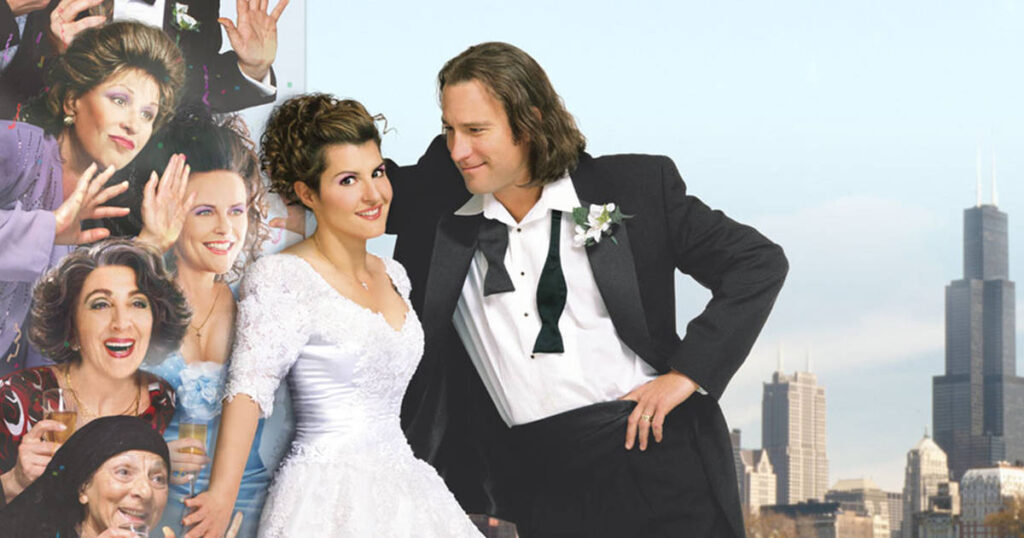
As I said, my mom worked hard over the years to build her own business. She chose a path that allowed her to work from home so that she could be there to support us (an incredibly tough job, serving the “roles” that multiple parents would provide in a traditional household). It meant so much sacrifice, but she did it. She found a way to make both family and work important. She also told me at a very early age that my body was a temple. That size and weight were not the most important thing. But that resentment and pain could take a toll on a body. She believed and taught me that unexpressed hurt can and will manifest itself in someone’s body, and that these issues can take many forms (as it had with my grandmother, in her view, who’s extra weight was in direct rebellion to her husband’s overt judgments and objectification of the bodies of the women in his life). My mom’s rebellion was a conscious attempt at being a cycle breaker for our family. I spent most of my childhood bearing witness to a generational patriarchy that my mom was beholden to, but I see now just how conscious of this she was, and reflect on so many little things she did while trying to fight her way out.
With her guidance, I found my way in life and today have a healthy, equal marriage driven by my own actions. There were many years in which my husband and I both worked, as I balanced finishing my bachelor’s, earning a teaching certificate, and completing a master’s program while he was building a business, and we both raised our small children. While I live a life now in what could be seen as a “traditional” woman’s role—I stay at home with my kids while my husband works — I do not believe the logistics of my current “job” within our marriage and family define who I am, nor does my husband. In fact, we often joke about how much we appreciate that we got together young enough to truly have nothing that the other ever “built” before we were together. We were poor and suffering together and feel strongly that we equally built the life we have today, despite the optics or logistical roles we each fulfilled in bringing our life to where it is now. Our mutual respect for each other allows our roles to be equally valuable regardless of the stories told by the world that dismiss the value of stay-at-home moms. My mom’s fighting spirit lives on in me and her ability to do life differently is why I don’t feel stuck in any one role in my life. I chose my path.
But the generational trauma of patriarchy could have been mine if my mom had chosen to follow suit with her family before her. She could have submitted. Instead, she chose to follow more feminine voices in her life. More truth telling. She was not perfect. She struggled—and I have my own work to do to keep moving forward—but she helped bring some aspects of the patriarchy into focus in our lives so that we could break free. And I honor that part of her. Because she was not fully free of its wounds even when she died.
She was still talking about her relationship with her dad, and the many struggles she felt in dealing with him, as she laid in her bed in hospice. Her relationship with him had been to help take care of anything he needed for the 20 plus years since my grandma had died. She would plan birthday parties, hire nurses, talk to his aid about his needs, talk to doctors. And he expected it. He came to stay with her for holidays and he expected to be catered to. He could be wonderful and kind, and he genuinely loved his grandchildren, but he had an obvious expectation toward the women in his life to serve his needs, especially my mother. And she often did exactly what he wanted, when he wanted.
When she went into the hospital fighting cancer in Arizona in April of 2020, he was starting in home dialysis in Florida and it was incredibly hard for her that she was supposed to take care of him and couldn’t. Instead it was suddenly her who required help and care. So her brothers took over his care while she did radiation in the hospital. After a few weeks without improvement we needed to find her hospice care for an unknown amount of time and we asked her dad and brothers to help her financially to provide whatever care would be needed. We didn’t know how long she had but it was obvious she would not be able to work and would need full time care. It meant something to her that her dad and brothers stepped up to contribute financially as we made plans for her life after the treatment. She had spent her life working to provide for herself and us financially and did not have savings or retirement to fall back on. She had a strong sense of having to do it all on her own as a single mother and did not assume she would receive help or support. There was a relaxation that came from her father and brothers providing for her life financially in what she hoped was time to heal. I think she felt like her needs were finally being made important. She finally felt that she mattered.
My mom’s fighting spirit lives on in me and her ability to do life differently is why I don’t feel stuck in any one role in my life. I chose my path.
And then it all came to a close faster than expected. My mom entered hospice at the end of May and we were told she only had a few weeks. My grandpa had also been showing some signs of declining and passed away rather suddenly on June 3rd while my mom was in hospice. It’s strange to recognize that, despite their lives being so intertwined, my mother and her father didn’t see each other in their final weeks. And then she followed him on June 17th. Even though they did not get to see each other in their final weeks, there was a healing and understanding I believe my mom came to. A break from being the caregiver for my mom and the feelings of support she felt from her father, even though from a distance, meant the world to her, and subsequently, to all of us as her children. Obviously there could be and are a million stories intermingled between my mother and her father to go along with the few I told here, but what I saw then and see now is how our stories shape us. The feelings my mom developed as a girl growing up in a male dominant family was a piece of her that she fought against, saw reinforced in other experiences, and generally wrestled with her whole life – and even though she may have never found full peace with her relationship toward the patriarchal challenges she faced, her example and struggle made (and still makes) a difference for me and my siblings.
And so what’s next? My children. As I raise two young men and two young women I hope that I will break even more patriarchal cycles for them. Everyday my husband and I will do our best to give them more balance and more understanding of what they face in the world so that they will be freer than we are. I am still affected by all the patriarchal stories the world tells me, but I’m grateful to know opposing stories, and to have the support I do within my home. I hope that work like this will spread these stories so that it can become our shared narrative (around the world) to not cast, place, judge or otherwise deal with anyone purely based on the preconceived notions and inherited views of their expected “gender’s role”. I know that my children will have to fight less tomorrow because I’m fighting today. Because my mother fought before me. And that’s all I can do. And to tell my mom “Thank you” and “I love you.”
Lauren Prakke
Do the Radically New to Change the Stubbornly Old
Winston Churchill once said a fanatic is one who can’t change his mind and won’t change the subject.
What if I told you I was going to change your life today? I’m going to do that by helping you change things, from major issues like the climate to just getting your kids to pick up after themselves. How? Well change requires a fresh novel strategy (that’s actually what I spend my time doing). Whether it’s staging a production or curating a show, my colleagues and I create change using unique daringly creative methods to raise social awareness, largely through the arts. I also love thinking about smarter ways to approach social issues and how science can help us create positive change.
My interest in this goes back to when I was a kid. At that time, like everyone else, I used to love Big Macs and my mother is really fed up with my refusal to eat vegetables. She kept saying that my passion for quarter pounders with cheese was bad for my health, cruel to animals, and also responsible for damaging our planet. But the more she kept repeating that, the more I tuned her out. So she took a fresh new approach; in fact a rather sharp left turn.

At the end of her tether, my mother took me to see these adorable happy little calves grazing in a sunny field and I remember playing with these two animals and thinking that this was the best day of my life. She then told me that she was taking me to see more animals. I was so excited! Could have to be to see the giraffes?! You see, as a New York City kid I only knew of two animals: pigeons and rats. Everything that had wings was obviously a different breed of pigeon to me as a kid. In any case, it turned out to be neither. We went to a meat-processing factory.
I could hear the dying squeals of the little calves as they were pushed toward their slaughter. She wanted me to see precisely what happened to make my “Happy Meal”—a tough approach to make me see the point. But did her change in strategy work? It was incredibly effective, and one day I might even finish therapy. Do the radically new to change the stubbornly old.
A study from Dr. Kim Lavoie of Montreal Behavioral Medicine Center shows that people will cognitively avoid things that they don’t want to be real. It’s a natural defense mechanism. So how do we get around an innate defense mechanism when humanity is literally on the line at times? Like with fossil fuels—do you ever get frustrated by the fact the most renowned scientists worldwide confirm that fossil fuels are not sustainable, and yet, we either largely disbelieve them or choose to totally ignore that reality. Why?
Well, social scientists have taught us that if people have built their identity on accepting or rejecting a certain set of facts, then arguing over those facts just causes them to dig in deeper to that untruth. And if you’re discussing politics, it’s even worse. People have to have about three moments of positive feelings for every one moment of negativity. Oh, and you need a 5:1 ratio of positive to negative comments if you’re talking to your spouse (evidence that marriage is even harder than politics)!
Ironically, the idea is a novel approach in itself for many, but think about it. We get tired when we hear the same admonitions over and over again, whether they’re as simple as ‘pick up after yourself’ or ‘stand up’ straight…or as serious as ‘pay women an equal wage’. In fact, the 20th century ‘eat your vegetables’ has become the 21st century climate change. We hear it and we agree that it’s a good point, even the right thing to do, but we actually disconnect from it. Because warnings that are repeated the same way over and over lose their punch…which means they’re actually pointless to repeat.
…warnings that are repeated the same way over and over lose their punch…which means they’re actually pointless to repeat.
I met a woman who said that she didn’t care about climate change and I was genuinely shocked. I said “Isn’t climate change a world issue? Isn’t it a human race issue?” Did she think that severe hurricanes and floods were going to carefully skip over her house just because she didn’t care? I could have argued with her, but instead I asked her about her family, her kids, her hopes for the future, and she relaxed a bit. I then told her about my concerns for the future and she actually listened! Do the radically new to change the stubbornly old. Find something in common and build from there. This softens people’s defenses and makes them more receptive to opening their minds. It stops people from digging deeper into their beliefs. It turns out that when people build up even a small buffer of good will, their conversations go much better. Novel approaches result in superior outcomes.

The Boston Symphony Orchestra wanted to diversify its male-dominated orchestra. If you have the top musicians playing, it follows that you’ll have the best orchestra so they conducted an experiment with a series of blind auditions where the players were behind a screen. After the additions what do you think happened? Nothing changed, it still skewed all male. Everyone was puzzled. Then someone had the novel idea to have the musicians take their shoes off, this way the judges couldn’t hear the clicking sound of a woman’s heels as she walked onto the stage. Once the musicians removed their shoes and auditioned what do you think happened? Almost 50% of the women passed the audition! The reason was that the sound of the women’s heels as they entered the audition had unknowingly influenced the judges.
Even with the best intentions, unconscious bias plays an astonishingly outsized role in our society. That orchestra will now be the best in the world because they now have the top musicians. So, by approaching the problem in a manner that they had never done before, the brain was forced to see it differently and it meant their orchestra was up to fifty percent better because they hired the most skilled people for the job. You can easily extrapolate that story out to every industry in the world and see how losing unconscious bias by trying something new is one of the most seismic changes we can make to improve our culture and actually even possibly our planet.
It’s surprising how young these biases can form. Did you know that a research study asked small children whether a really really smart main character in a story was a man or a woman? And that by the age of six both boys and girls were already less likely to guess that the main character was a woman rather than a man. Think about it: what if the cure for cancer is inside the mind of a young girl who lost her confidence early on and gave up her dream of being a scientist? We simply cannot afford to lose the brilliant minds of 50% of the population to unconscious discrimination, and it requires us to create a radically new change and change stubbornly old problems. We often aren’t even aware that we have these biases, and until we understand that we all have them we can’t fully grasp the need for why the brain needs a radically novel way of seeing things.
When my mother took me to the slaughterhouse, she was intuitively proving the research of the neuroscientist Gregory Burns he said, “the brain must be provided with something it has never before processed to force it out of predictable perceptions.” In other words, in order to get a different outcome, we need to present the brain with a novel way, a radically different way to fully take in this information and get a different outcome. Every one of us listening has the power to make important change.
the brain needs a radically novel way of seeing things
Okay, so I see we’re at the 6-minute mark and did you know that after about 6 minutes most adults will not sustain attention if the topic is not interesting to them? So I’m sure this one is fascinating to you, but just in case I’m going to throw you a curveball: do you ever think about the fact that, from an evolutionary perspective, sex is more important than life? I see you all stood up straight! Okay, recent studies from Cornell and Rutgers Universities have shown that men who said they were in relationships with feminist women had more sexual satisfaction. If you’re wondering if you’re a feminist because that term has become so misused over the years let me help clear it up and simply ask you this: do you think women should have the same opportunities as men? If so, you’re a feminist, whatever your gender.
Far from disrupting heterosexual relationships, men who identify as feminist have more sex more frequently and therefore better relationships. Now that’s certainly an example of do the radically new to change the stubbornly old, and it’s a motivating factor toward moving gender equality forward. Yes people, we will do what it takes! But here’s the greater point: if I were a drone on about statistical inequity between men and women in the workplace you would have all switched off, very likely. And by introducing the magic word, that word that somehow can be heard across the noisiest room—sex—everyone here switched back on. What’s going on? Did she say sex? What’s this? Now suddenly because I found a little known research and used a novel approach, I have your full attention to get you to think about your openness to a serious issue that harms billions (the lack of gender equality) and I could then move the issue forward. Do the radically new to change the stubbornly old.
“To improve is to change. To be perfect is to change often”, said the great Winston Churchill.
So go and say and do it differently.
I’m fighting today

because my mother fought before me.
Listen to the Episode
&
Share your Comments with us below!

